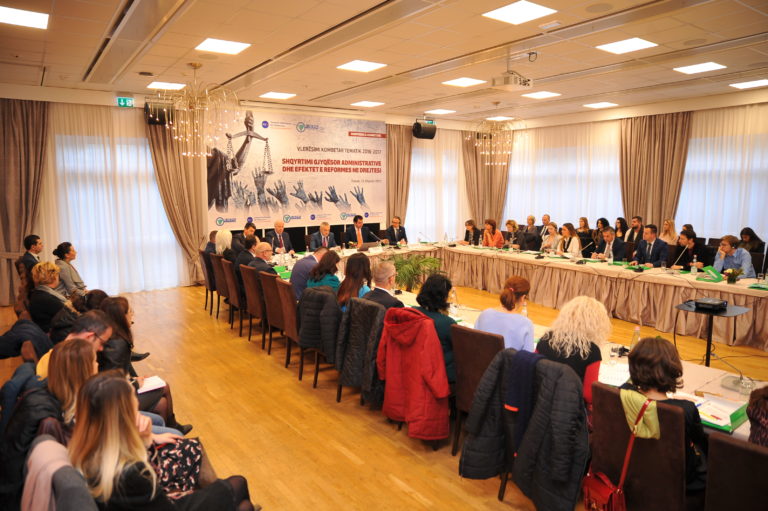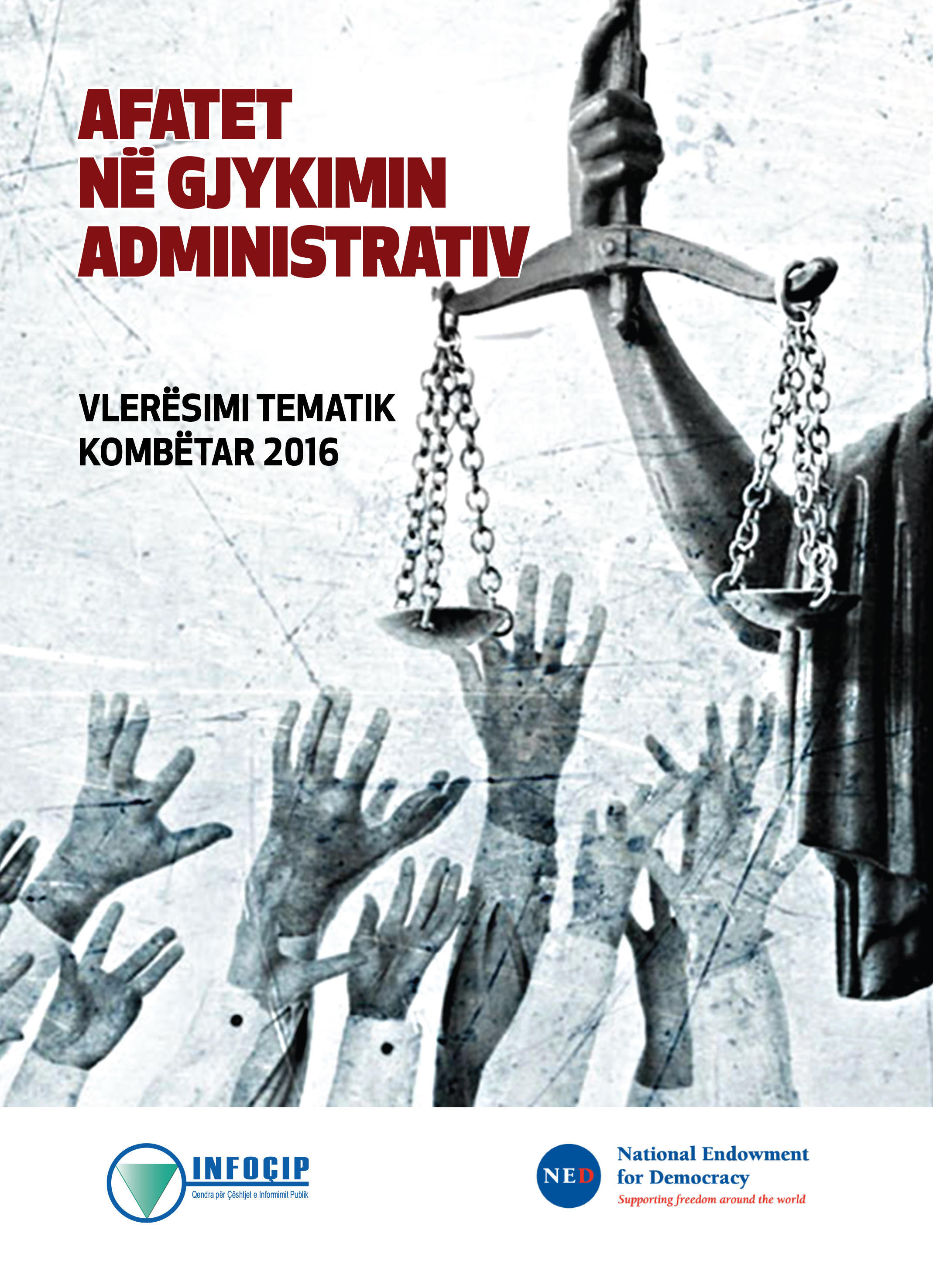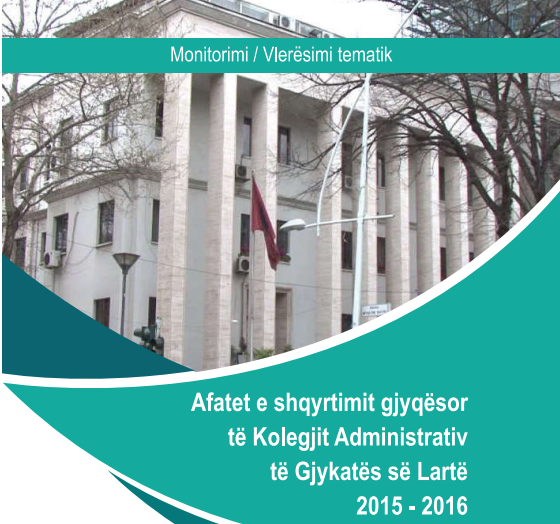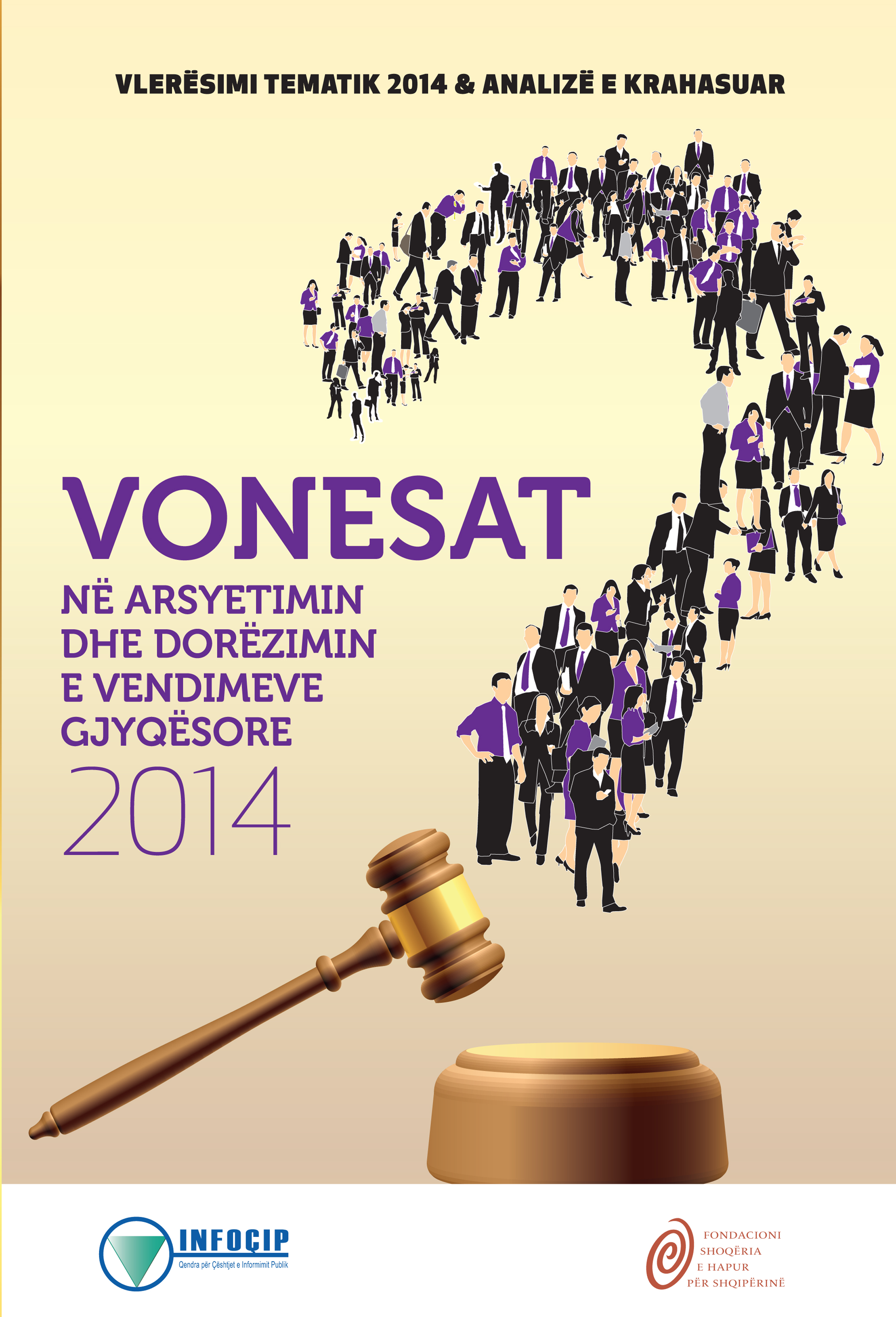President of the Republic, Ilir Meta addresses the National Conference 2017, “Court proceedings efficiency in Administrative Courts of Albania”. Meta: INFOCIP’s Report, highly appreciated
December 15th, 2017, Tirana, ALBANIA – The President of the Republic of Albania, H.E. Mr. Ilir Meta attended the Conference “Administrative Judicial Review in the Republic of Albania and the Effects of Justice Reform”, organized by Center for Public Information Issues (INFOÇIP), supported by NED. President Meta in his opening speech delivered very important messages to the administrative courts’ representatives in the aula as well to the main institutional bodies also present to this important event. He also addressed the Albanian public thought the extended media presence that covered this activity. In order to have all this messages noted and forwarded in English, INFOCIP is publishing His full speech below, as it was released by his own staff in the official page of the President of the Republic and disseminated to the national media:
“I was pleased to receive the invitation of the Center for Public Information Issues, INFOÇIP, to participate today in this Conference, where will be presented the National Thematic Evaluation for 2016 regarding the implementation of procedural deadlines in the system of the Administrative Courts of our country. In this way, all of us, but first and foremost, judicial bodies will be introduced through this report to the quality of their work, seen from the unbiased point of view of Civil Society and its measuring tools”.
The main purpose in establishing Administrative Courts in Albanian was and remains the protection of the legitimate interests of the individual and of the business, the unjust actions or decisions that public institutions can take during their daily activity/operations. Since the beginning of establishing of these courts, a 4-year period has passed, and certainly during this time, their functioning has shown success, but at the same time, as for everything newly established, problems have been spotted too.

The Administrative Judgment, unlike other judgments, has two main distinctive features: the Speed of Judgment and Burden of Proof. The short deadlines of the administrative judicial review are the means to achieving the goal of an effective protection of citizens and businesses by the possible arbitrariness of the public administration, while the latter (the administration) is responsible for giving the burden of proof to convince the court that the decision-making of the public organ was rightful.
Precisely the speediness of judicial review and the burden of proof on the administrative public body, as part of the judicial process constitute the essence of the Administrative Justice judgment and affirm the spirit of the this courts system functions upon.

But from this 4-year history of the functioning of these courts, as well as from the data of this thematic evaluation which is released today, it has been noticed that, especially during 2016 there are cases when the spirit of the law has been turned down. Concretely, compliance with the time limits of the court review results a concerning problem. especially in some particular courts. Another concerns remains the compliance with legal deadlines in the Administrative Courts of Appeal.
Further more, Another problem which requires adequate solution is the situation created in the High Court, where the backlog has increased considerably, while the court body [number of justices and their assistants] has decreased. The shortage of necessary judicial staff required to comply with the challenging task of backlog reduction is therefore suffered by the Administrative Chamber of the High Court of Albania.
You will get to know more in details on the observed situation by the presentation of the Annual Thematic Evaluation Report [of INFOCIP] , but what is evident now is the fact that administrative judicial conflict has grown in recent years, placing the court in a difficult position in coping with the flow of appeals and consequently even in a challenging position to enforce court legal deadlines.
This data exposed today should bring reflection to highlight the cause of the problem and the best mechanism that solves it in the future. This situation, where the number of administrative litigation increases steadily, clearly shows that our society is failing to solve its problems with the administrative bodies, or either way, the activity of the public administration is shifting to result deriving from a not at all deep logical behavior, which will undoubtedly produce litigious conflict to be resolved later to the Administrative Courts.
A series of court cases, such as those of unfair dismissals of civil servants, the handling of appeals on pensions, or the objections to fines against businesses, are very sensitive issues that directly affect the family economy, but also the public finances, and a timely judgment and qualitative reasoning of it, should be in the focus not only of the judicial body, but of the public administration itself.
An individual, whose family interests are affected by an act or non-acting of the public administration, always has a subjective suspicion that an injustice has just been committed against him. Therefore, the Court must respond to this expectation on time, to clarify it, whether it has or is not right in the claims it has filed. The Constitution of the Republic of Albania has guaranteed the application of the fundamental principle of the rule of law, where part of it is a fair trial/process within reasonable time by an independent court as determined by the law. A court process within a reasonable time by an independent and transparent court is the ultimate outcome and the legitimate expectation of all citizens from reform in the justice system, seeking to discourage and punish in the same time corruption within the judicial system.
With the legal changes adopted in the framework of the Justice Reform, the way in which the judicial system will be reorganized and will have to function, including the administrative court, provides clearly for an increase of human resources in the judicial system and the redistribution of the courts’ services according to citizens’ requests and courts’ load.
We have already moved to the next stage, just as important as the lawmaking process, even more important, such as the implementation phase of this reform, and here we must demonstrate the same willingness , as if the situation in the judicial system does not change positively and within a reasonable time, then the goals of reform will not be really tangible.
Delays in the constitution of new judicial bodies that will govern the judicial system, specifically of the Judicial High Council, produce a negative chain effect throughout the system. Failure to establish this Council delays the resolution of the issues raised in completing the judicial body, or the territorial redistribution of resources, including administrative courts’.
If we ask courts to respect court review deadlines, we should also ask to any other institution to take seriously its actions and engage in accelerating the process of electing new justice system organs. From this Conference, I would like to call on all political forces, the Assembly, Civil Society and all actors of the judicial system involved in this process, to take concrete action as soon as possible, transparently, under the spirit of the Constitution as well as following the commissions of the Venice Commission, to make this major reform as realistic as possible, tangible, effective as quickly as possible, away from the politicization of extreme and for party interests of the day. Any further delay in this regard is to the detriment of the public interest, to the detriment of the courts, to the detriment of the reform itself in justice, and above all the expectations of Albanian citizens.
At the end of my speech, I highly appreciate the work done to complete and release this report by INFOÇIP. The evaluation data of the Administrative Courts for 2016 are complete and objectively expose the situation and evidences of these courts. This thematic assessment, which has analyzed many court data, is a positive example of the important contribution that Albanian Civil Society can provide to the justice institutions and I hope that the findings and recommendations will help to significantly improve this situation .
I wish you success in the works of this Conference! ”



LAST RELEASED PUBLICATION
MONITORING REPORT
Recent reports/studies
Partners / Donors
Local Branches
- Citizens' Transparency Office, Durrës (19)
- Citizens' Transparency Office, Korça (9)
- Election Situation Chamber (11)
- JUDICIARY (1)
- NED (11)
- www.vendime.al (5)
Foto lajm

- CPII anounces the monitoring result for Durres Municipal Council. It must be re-elected
Where we work














